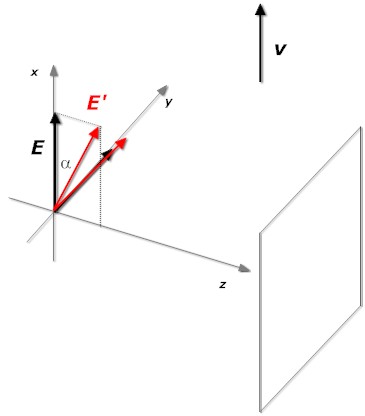Suppose there is a laser beam powerful enough to burn through iron aimed at a piece of iron. You observe this event while you are in the same frame as the piece of iron and the laser-beam generator. In this frame, there is a certain part of space that you know that the light is traveling through.
Now say that you get in a rocket that travels a few meters away from the laser beam in a direction perpendicular to eventually at a constant speed arbitrarily close to the speed of light. As you do so, the area that you knew the light was traveling through contracts in the direction that you are traveling in.
Say that the amplitude that you think that the light has decreases to the point where the light would no longer be carrying enough energy to burn through the piece of iron. If you see the iron stop being burned by the laser, our universe is seriously weird. I don't think this would happen. Would you see the laser continue to burn through the iron even though it does not seem to you to have the energy necessary to do so? Would this mean that, instead of having the length contract, that there is such a thing as absolute distance?
(If we suppose that the amplitude you perceive the laser to have remains constant regardless of what inertial frame you are in, then the laser would appear to have a constant amplitude even as objects around it continued to contract in the direction you are traveling through. This would mean that the laser would have to seem to affect more and more of space as you traveled faster and faster, so it seems it would have to seem to burn through more and more objects as you went faster, which doesn't seem right to me.)
Does this contradict the theory of relativity? Is there an error in here somewhere?
Thanks.

